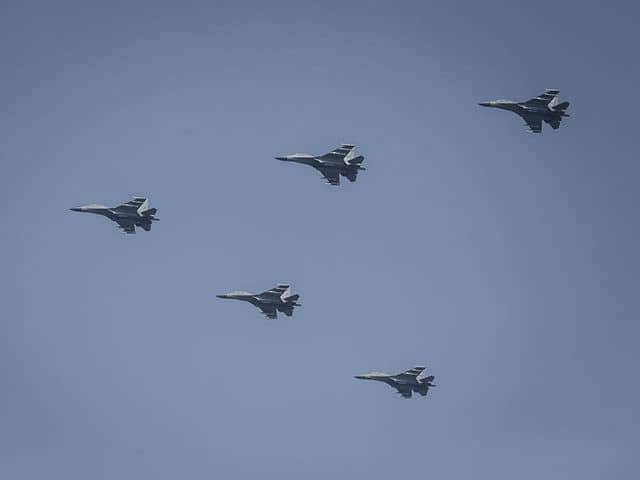China Sends Record Number of Warplanes into Taiwanese Airspace

The People’s Liberation Army (PLA) of China sent a record number of warplanes into Taiwan’s Air Defense Identification Zone (ADIZ) on Saturday and Sunday, an intimidating display staged only a few days after the inauguration of President Joe Biden in the United States.
China complained about the arrival of the U.S. aircraft carrier Theodore Roosevelt in the South China Sea, arguing the U.S. mission is “not conducive to peace and stability in the region.”
China sent 13 warplanes into Taiwan’s ADIZ on Saturday and 15 on Sunday. The first incursion included nuclear-capable bombers, fighter jets, and an anti-submarine aircraft. The second incursion featured more anti-sub planes, advanced fighters capable of using stealth technology, and a reconnaissance aircraft.
On both days, Taiwan scrambled fighter jets, activated its surface-to-air missile defenses, and broadcast radio warnings to the Chinese planes. The ADIZ is the outer layer of identification and control surrounding sovereign airspace. Sending military planes into an ADIZ is considered provocative, but is not criminal behavior under international law.
The Chinese flights on Saturday and Sunday were the largest penetrations of Taiwan’s ADIZ by the PLA on record, but smaller flights of PLA aircraft have been detected near Taiwan for the past 19 consecutive days. Analysts told Focus Taiwan they believed China wishes to send a menacing message not just to Taipei, but to the new administration in Washington.
At the same time Chinese warplanes were flying near Taiwan, the U.S. aircraft carrier Theodore Roosevelt and its battle group entered the South China Sea, pursuing what the U.S. Navy calls a Freedom of Navigation Operation (FONOP).
“After sailing through these waters throughout my 30-year career, it’s great to be in the South China Sea again, conducting routine operations, promoting freedom of the seas, and reassuring allies and partners,” said carrier group commander Rear Adm. Doug Verissimo, as quoted by the Taipei Times.
“With two-thirds of the world’s trade traveling through this very important region, it is vital that we maintain our presence and continue to promote the rules-based order which has allowed us all to prosper,” Verissimo added.
The Chinese Foreign Ministry objected to the presence of the Theodore Roosevelt in the South China Sea on Monday, saying America just wanted to “flex its muscles” and arguing the FONOP is “not conducive to peace and stability in the region.” The Foreign Ministry refused to answer questions about China’s provocative flights near Taiwan.
China’s state-run Global Times suggested on Sunday that the “PLA bomber swarm” that flew past Taiwan was actually using the Theodore Roosevelt as a “simulated target in an exercise.”
The Global Times also cited “analysts” who noted China has its own carrier battle group in the South China Sea to act as a “stabilizer for the regional situation.”
Another Global Times op-ed on Monday portrayed those PLA bomber swarms as a clear signal to both Taiwan and the Biden administration that they must reaffirm their commitment to the “one-China principle,” which Taiwan has purportedly threatened by acting defiantly toward Beijing:
If the tension across the Taiwan Straits is to be eased, we must return to its deteriorating starting point, which is the Democratic Progressive Party (DPP) authorities in Taiwan refusing to recognize the 1992 Consensus and opposing the one-China principle. All tensions across the Taiwan Straits originate from the DPP authorities’ perverse act. And this is in contradiction with the US establishment’s general direction in controlling the situation in the Taiwan Straits, and is also incompatible with the three China-US joint communiqués. If the US places its China policy on the basis of the DPP authorities’ reckless moves, which obviously have a trend of Taiwan secessionism, then it will bear long-term and cumulative strategic risks. The easing of the tension in the Taiwan Straits should start from the political point of view. It cannot reach a breakthrough through strategy. The interaction among the Chinese mainland, the US and the island of Taiwan has been broken in all directions and is difficult to repair. In the later period of the Trump administration, the situation across the Taiwan Straits actually reached the edge of collapse. If the Biden administration does not want the situation to get out of control or get itself seriously involved, they should sent out a clear political signal to distinguish themselves from the previous administration’s mischief, and restore the controllability of the Taiwan Straits on the basis of the one-China principle.
The U.S. State Department responded to China’s flights through Taiwan’s ADIZ by calling on Beijing to halt its efforts to “intimidate its neighbors, including Taiwan.”
“We urge Beijing to cease its military, diplomatic, and economic pressure against Taiwan and instead engage in meaningful dialogue with Taiwan’s democratically elected representatives. Our commitment to Taiwan is rock-solid and contributes to the maintenance of peace and stability across the Taiwan Strait and within the region,” said State Department spokesman Ned Price.
Photo: Wang He/Getty Images
Link: China Sends Record Number of Warplanes into Taiwanese Airspace (breitbart.com)











